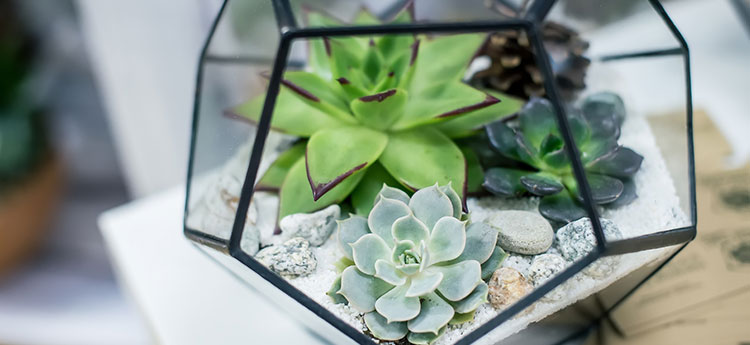
Despite our massive land mass and spectacular natural scenery, Aussies are amongst the most highly urbanised people on the planet, with almost 90% of us squeezing into a handful of the nation’s urban areas. Whilst Australian cities are also amongst the most liveable on the planet where parks and well-designed streetscapes abound, many of us work long hours during the week, giving us precious little time to enjoy the greenery around us and contributing to increasing rates of preventable stress and anxiety. One simple solution for busy workers and those of us yearning for a little green therapy is to “bring the outdoors inside” and what better way to achieve this than through decorating our living spaces with indoor plants.
We spoke to our very own gardeners and florists to list five of the best species of indoor plants you might like to consider to decorate your space. Better air quality, lower noise and improved mental wellbeing are just a few steps away!
Boston Fern
Species Name: Nephrolepis exaltata
Size: up to 1.2 metres tall
Ideal Temperature Range: 15-23 degrees Celsius
Place In: Bathroom, kitchen, laundry, living spaces
Basic Care Tips: Keep in moderate, filtered natural light, water regularly
A highly versatile indoor plant, Boston Ferns are especially well suited to ‘wet areas’ of a house such as bathrooms, kitchens, laundry and even toilets. Featuring soft, bright green fronds, their compact size makes them perfect for hanging from a basket or decorating an otherwise empty corner. Keep moist, expose to moderate natural light and you can expect this hardy plant to live for decades!
Fiddleleaf Fig
Species Name: Ficus lyrata
Size: up to 4.5 metres tall
Ideal Temperature Range: 18-23 degrees Celsius
Place In: Bedroom, living spaces
Basic Care Tips: Keep in moderate, filtered natural light; allow surface soil to dry between watering
One of the bigger indoor plant varieties, Fiddleleaf Figs have violin-shaped leaves that blossom into colourful flowery delights given adequate care and the right conditions. They respond best to moderate natural light (although don’t place them directly in the sun), milder temperatures and surface soil which has dried in between regular watering.
Mother-In-Law’s Tongue
Species Name: Sanseveria
Size: 70 cm tall
Ideal Temperature Range: 18-27 degrees Celsius
Place In: Bathroom, bedroom, kitchen, laundry, living spaces
Basic Care Tips: Expose to moderate-bright natural light, water sparingly in winter and once per week in summer
One of the hardiest indoor plants of all, Mother-in-Law’s Tongue feature long, thin and succulent leaves which do well in moderate to bright natural light. They’re also one of the easiest indoor plants to care for, requiring little watering in the winter months (they only grow in summer) and only a once per week watering (if that) in summer. Given their smaller size, they’re able to be placed just about anywhere in your home!
Norfolk Island Pine
Species Name: Araucaria heterophylla
Size: up to 3 metres tall
Ideal Temperature Range: 15-23 degrees Celsius
Place In: Living spaces
Basic Care Tips: Expose to ample natural light, allow surface soil to dry between watering
With a soft texture perfect for adding a cosy feeling to any room and especially well-suited to cooler-mild climates, Norfolk Island Pines resemble small Christmas trees, rarely growing taller than 10 feet. Be sure to give yours plenty of natural light and allow the surface soil to dry between watering.
Succulents
Species Name: Kalanchoe thyrsiflora (Flapjacks), Euphorbia similis (Candelabra Tree)
Size: 30cm-1.2 metres tall
Ideal Temperature Range: 15-23 degrees Celsius
Place In: Bathroom, bedroom, kitchen, laundry, living spaces
Basic Care Tips: Expose to ample natural light, water sparingly
No list of indoor plants would be complete without mentioning the ultimate species in fuss-free maintenance, that’s of course Succulents. Available in a variety of species including Candelabra Trees, Echeveria’s and Flapjacks, all a Succulent requires is a bright, sunny spot plus an occasional water for it to last for years. Keep in mind; some succulent varieties do have sharp spines so keep away from children! Succulents also make great outdoor plants too.


